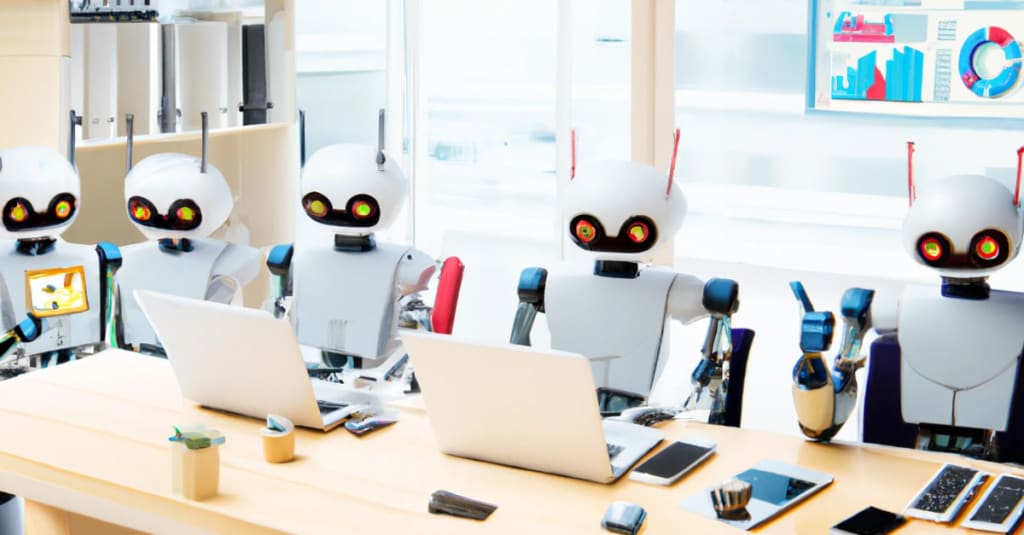The Rise of Ai: will Machines Replace Humans in the workplace?
AI replace humans?

Artificial Intelligence (AI) has been the talk of the town for the last few years. It is a technology that has transformed various industries and has become an essential tool for many businesses. With its advanced capabilities and potential to automate tasks, there is a growing concern that AI will replace humans in the workplace. While it is true that AI can automate some jobs, it is crucial to understand that it cannot replace the unique skills and qualities that humans possess.
One of the significant benefits of AI is its ability to automate repetitive and mundane tasks. This allows humans to focus on more complex and creative tasks that require human ingenuity. In healthcare, for instance, AI-powered machines can help doctors diagnose diseases, analyze medical scans, and suggest appropriate treatments. By automating these tasks, doctors have more time to interact with patients and provide personalized care. Similarly, in manufacturing, robots powered by AI can automate repetitive tasks such as welding, painting, and assembling, freeing up workers to focus on more complex tasks such as quality control and product design.
Another benefit of AI is its ability to provide accurate and real-time insights from large datasets. By analyzing customer behavior patterns, for instance, AI-powered recommendation engines can provide personalized product recommendations, increasing customer satisfaction and loyalty. In finance, AI-powered algorithms can analyze market trends, predict future changes, and inform investment decisions. The result is increased efficiency and profitability for businesses.
However, the fear of AI replacing humans in the workplace stems from the belief that AI is a perfect and independent entity that can replace human skills. This is not entirely true. While AI can automate some jobs, it cannot entirely replace human skills such as creativity, empathy, and critical thinking. For example, in the legal sector, AI-powered machines can assist lawyers in conducting research, analyzing cases, and predicting case outcomes. However, they cannot replace human lawyers' abilities to argue a case, negotiate settlements, or provide legal advice.
In addition, AI requires human input to function effectively. Machines learn from data, and the quality of data fed into the machine determines the accuracy of the results. Therefore, humans must create algorithms, train machines, and monitor their performance to ensure they are functioning as intended. This means that AI-powered machines are not independent entities but rather tools that require human guidance.
Moreover, there are ethical considerations that come with the use of AI in the workplace. There are concerns about data privacy, bias, and accountability. The algorithms used to train machines can be biased, leading to unfair outcomes. This means that humans must ensure that the data used to train machines is unbiased and representative of the population it is serving. Additionally, humans must ensure that AI-powered machines are transparent, and decisions made by machines can be explained to ensure accountability.
The use of AI in the workplace also raises concerns about the impact on the workforce. Some argue that AI will lead to job losses and unemployment. While it is true that some jobs may become automated, it is essential to note that new jobs will also emerge. The development and deployment of AI technology require human input, which means that new job roles will emerge that require new skills and knowledge. Therefore, humans must adapt and acquire new skills to remain relevant in the workplace.
Moreover, the use of AI can lead to increased productivity and efficiency, which can benefit both businesses and employees. For instance, AI can automate tedious and time-consuming tasks, allowing employees to focus on more valuable tasks that require creativity and critical thinking. Additionally, the use of AI can lead to the development of new products and services that meet customer needs and preferences, leading to increased customer satisfaction and loyalty.
In conclusion, AI is an innovative technology that has transformed various industries and has become an essential tool for many businesses. While there are concerns that AI will replace humans in the workplace, it is crucial to understand that AI
About the Creator
Eman ali
Hello! every one my name is eman ali iam a student of bscs and part time story writer.
Enjoyed the story? Support the Creator.
Subscribe for free to receive all their stories in your feed. You could also pledge your support or give them a one-off tip, letting them know you appreciate their work.






Comments
There are no comments for this story
Be the first to respond and start the conversation.